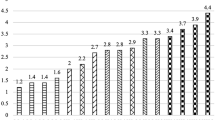Abstract
A focus on standards for assessing proposals for online teaching of practical and professional ethics provides an approach to standards for raising the level of online teaching. Intellectual merit, broad impact, and integration of research and teaching featuring a high level of interactivity are key criteria for evaluation. Especially noted is research that can serve to prepare instructors, to enrich the content of courses, and to stimulate further research. Yet raising the level of online teaching hinges on developing easy access and navigability in an online curriculum.
Similar content being viewed by others
References
National Science Foundation. “Review Criteria”. Grant Proposal Guide. NSF 04-23. July 2004. p. 39; http://www.nsf.gov/pubs/gpg/nsf04_23/nsf04_23.pdf
http://ethics.iit.edu/codes/index.html.
Sieber, J.E. (2005) Misconceptions and Realities about Teaching Online, Science and Engineering Ethics 11: 329–340.
Huff, C. and Frey, W. (2005) Moral Pedagogy and Practical Ethics, Science and Engineering Ethics 11: 389–408.
Davis, M. (1997) Developing and Using Cases to Teach Practical Ethics. Teaching Philosophy 20/4: 353–385.
Schrag, B. (2005). Teaching Research Ethics: Can Web-Based Instruction Satisfy Appropriate Pedagogical Objectives? Science and Engineering Ethics 11: 347–366.
Segerstrale, U. (2001) “Judging ‘Good Science’: Toward Cooperation between Scientists and Lawyers,” in: Weil, V. (ed.) Trying Times: Science and Responsibilities after Daubert, Center for the Study of Ethics in the Professions and Institute for Science, Law and Technology, IIT: Chicago, Il, pp. 48–62.
Davis, Michael (1998) Thinking Like an Engineer: Studies in the Ethics of a Profession. Practical and Professional Ethics Series, Oxford University Press, New York.
Author information
Authors and Affiliations
Corresponding author
Rights and permissions
About this article
Cite this article
Weil, V. Standards for evaluating proposals to develop ethics curricula. SCI ENG ETHICS 11, 501–507 (2005). https://doi.org/10.1007/s11948-005-0020-5
Received:
Revised:
Accepted:
Issue Date:
DOI: https://doi.org/10.1007/s11948-005-0020-5




